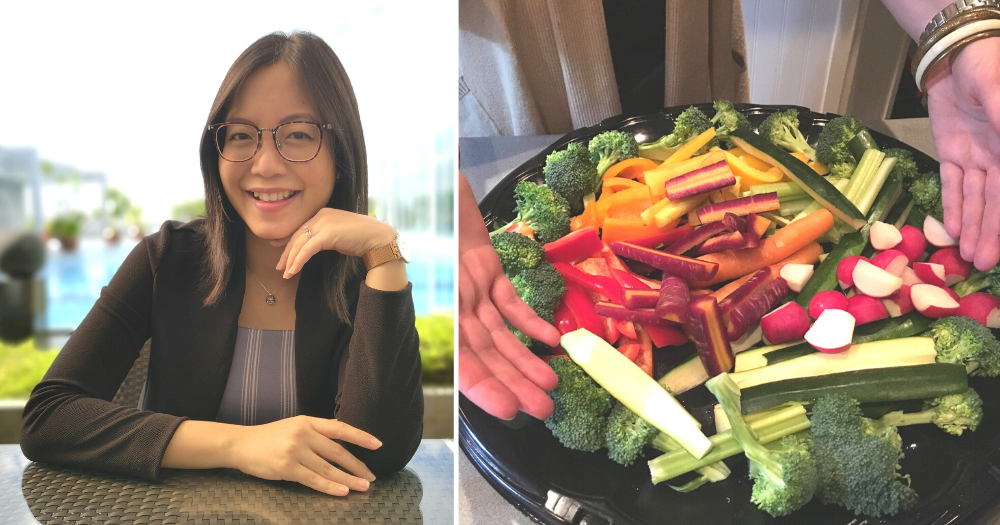Finding accurate information online about healthcare and supplements is a tricky field for the layperson to navigate.
Often the search results from Google make you question the veracity of online information.
Considering the hyper-awareness of hygiene and health lately, vitamins and other supplements are some coveted products people have been turning to, to boost their immunity.
If you’re unsure of the pros and cons of taking supplements, and sceptical of visiting the likes of Wikihow online, I talked to a certified nutritionist, Esther Yee, to ask all the questions about vitamins, supplements and immunity bouncing around your head, so you know, you don’t have to.
 Photo from GNC
Photo from GNC
Yee is a consultant nutritionist at ONI Global Group, which is the sole franchisee for GNC in Singapore. She speaks at various nutrition-related talks at corporate organisations and public health seminars and has also contributed to several national health initiatives.
So you can rest assured that the advice she gives in this article is #legit.
Let’s start with an appetiser: does an apple a day really keep the doctor away?
This is a saying literally everyone has heard of. It’s so common that it’s practically a nursery rhyme. According to Yee though, there is actual truth grounded in this old adage.
Apples are a good source of nutrition. In addition to the vitamin C content in apples, the fruit also contains pectin—a plant compound that feeds the friendly bacteria in our gut to help us fight off bad bacteria which can cause indigestion or upset stomachs.
Aside from apples, what other fruits can we eat to boost immunity?
Fruits are a great source of beneficial phytonutrients (plant-based nutrients). Where possible, it is always ideal to eat a good variety of fruits, Yee said.
In terms of natural immune boosters, citrus fruits such as grapefruit and oranges are on top of the list as they are especially rich in vitamin C, which is a key vitamin when it comes to boosting our immunity.
Other non-citrus fruits that are high in vitamin C include berries, kiwi, papaya, and guava.
If we can get the vitamins from eating fruits, why do we still need to take supplements?
Ideally, we should be able to get the nutrients we need from healthy and balanced meals every day.
But to be honest, who has the time for that? (and don’t forget about those guilty indulgence of fast food and bubble teas)

Oftentimes, life gets in the way, and many of us instead opt for takeaway food, ready-prepared meals or dining out at restaurants or food courts, instead of well-balanced, nourishing home-cooked meals (sorry, mum).
Admit it, some of us can also be pretty picky with certain foods. So while it is ideal to obtain all the nutrients we need from our daily diet, it may not always be practical or possible.
This, Yee said, is where supplements can help to close up any nutritional gaps.
Maybe the converse might be true—if I take supplements, does that mean I can eat all the unhealthy food I want? (hehehe)
It’s still a no—we’re not getting away with it that easily.
Taking your vitamins is definitely not a “passport” to allow you to consume unhealthy foods freely, Yee said.

Supplements help to bridge nutritional gaps that may arise from an imbalanced diet. However, they cannot counteract the “damage” incurred from excessive intake of unhealthy food like junk food, which are loaded with fats, oil, sugar, salt or MSG.
Excessive consumption of unhealthy foods—which contain few vitamins and minerals and have low nutritional value—can in the long term cause health issues like increased risk of diabetes, heart disease, and cancer.
This can ultimately weaken our immune system.
Now, getting to the meat of it. How exactly do vitamins and probiotics boost our immune system?
What are vitamins? They’re basically essential nutrients we need to sustain normal body functions, growth and development. And of the 13 types of vitamins in total, vitamin C and D are two of the most important in terms of benefiting our immune system.
Research and studies have shown that vitamin C contributes in stimulating the production of immune cells to fight off viruses. It can increase our resistance and shorten the duration of illnesses.
Yee recommends GNC Triple C 1000 to help keep the body’s immune defense up. The tablets provide three times the benefits of a regular vitamin C as it contains various nutrients to support the body’s antioxidant defenses and provide immune protection.

Vitamin D is another important compound which performs several crucial functions in our body. Also known as the sunshine vitamin—because our body is able to produce vitamin D when exposed to sunlight—it helps to regulate the absorption of calcium and phosphorus in our body, and contributes towards facilitating normal immune functions.
Ok, so I know about vitamins, but what are probiotics?
Probiotics might sound like some form of newfangled robotics, but really, they basically refer to what can be colloquially known as friendly bacteria.
The presence of good bacteria in our digestive system provides heightened defense against bad bacteria such as Listeria, Salmonella and E.Coli that can cause diarrhea, vomiting and other health complications.
By preventing bad bacteria from multiplying, this can reduce the risks of infection and/or inflammation. Good bacteria can also produce substances that stop, or even kill, harmful bacteria, which can help with overall immunity.
All GNC probiotics feature LAB4 probiotics, which Yee said are friendly bacteria strains that are clinically proven to provide gut & immunity benefits.
If you’re looking for some probiotics for that upset and rumbling tummy, GNC has a whole range you can choose from, from those you can take daily, to extra strength ones, and even specialised formulas which cater to elderly or pregnant women for example.
GNC Probiotics also do not require refrigeration, which makes it all the more easy and convenient to bring along in your bag and pop a capsule on the go.
So what does it mean for me if I have a stronger immune system?
This is pretty much like having trained, elite soldiers, fighting the war for us. Every day, we are exposed to external threats that can challenge our immune system—germs, bacteria, viruses etc. When our immune system is strong, we will have stronger resistance against these threats.
Apart from having a balanced diet and eating supplements, other ways to boost our immunity include:
- Practising good personal hygiene like washing and sanitising our hands frequently,
- Avoiding overly crowded areas and,
- Incorporating fitness as part of our lifestyle.
You can head here to check out GNC’s range of immunity-boosting supplements.
Does vitamin C really protect us from the flu or the common cold?
Now that we all know about the benefits of vitamins and how they boost our immune system, you might be wondering how effective they are when the going gets tough. Like when we fall ill.
According to Yee, numerous clinical studies have shown the effectiveness of vitamin C in boosting our immunity by stimulating the production of immune cells to fight viruses. This can increase our resistance and shorten the duration of illness and suffering.
A 2010 research paper also showed that vitamin D may play a role in helping to reduce a person’s likelihood of developing the flu.
A good multivitamin (like GNC Mega Men and Women’s Ultra Mega) can help by providing your body with the nutrients it needs, to keep our immune system functioning optimally.
Apart from these vitamins, our immune system is highly complex, and requires different nutrients to activate and support the different types of immune cells for strong protection against infections.
An imbalanced diet, coupled with daily stress and insufficient sleep, can wreak havoc and weaken our immune system.
So yes, while supplements can help to reduce our risks of falling sick and help with recovery time, one still needs to do their part towards maintaining a healthy lifestyle as well.
Is there a possibility of “overdosing” on vitamins? Is it safe to take different types of vitamin supplements together?
If you’ve ever had that tiny fear that popping too many vitamins might lead to some sort of “overdose”, you’re not alone.
While an “overdose” is unlikely, it really depends on the type and combination of supplements you are taking.
General nutrients like vitamin C, fish oil and calcium are fine to take together.
However, Yee also advised people to pay attention to whether there are repeated nutrients in the supplements taken, to prevent consuming more than what is needed.
Most importantly though, is to check the bottle’s label and always follow the directions of use.
One should also buy supplements only from trusted, credible brands and from reliable retail and online platforms.
My mother used to tell me vitamins with fruity flavours (such as those for kids) are less effective than those without. Is this a myth?
Good news for everyone! The fruity flavours in children’s vitamins don’t actually take away from the supplement’s effectiveness (take that, mum).
The effectiveness of the vitamin supplement depends more on the nutrients present in the formula.
Yee stated that the more palatable fruit flavours help children to accept the supplement more easily. In the long term, this will then inculcate a daily habit of taking a multi-supplement, which helps to close any nutritional gaps.
If you want to make your kid (or adult child) happy with some fruity vitamins, check out GNC’s Kids Multivitamin gummies which come in the form of yummy fruit gummies.

This is a whole lot of information to take in. So now that I know all this, how do I choose the type of supplement I need or the one that’s best for me?
It really depends on one’s health concerns and nutritional needs, as well as their fitness and nutritional goals.
Nutritional needs also change over time due to factors such as age, life phases and dietary restrictions.
For example, those aged 51 and above will require more calcium than before. While vegetarians or vegans will benefit from vitamin B12 supplements, as plant-based foods are lacking in that vitamin.
If you’re really unsure about what the supplements you can and should take, you can simply head to any GNC outlets and ask any of their trained retail associates to get personalized recommendations.
Or if you’re a tad shy, you can write in with any nutrition-related questions to [email protected] to get an answer from the team of nutritionists. You can even chat with a nutritionist live!
GNC’s website also has a library of health and nutrition-related articles and resources.
If you wish to try some of the recommended supplements, now is a good time to head over to GNC stores as they are having a 20 per cent storewide promotion till Mar. 31, 2020.
Better still, from now to Mar. 31, 2020 Mothership readers can get a free 2-year VIP membership worth S$15 by using this code: MSVIP to check out membership for free online. This VIP membership comes with birthday discounts (35 per cent off all regular price supplements!) and you even get Bonus$ awarded too when you shop with GNC. You can check out all the perks here.
This sponsored article by GNC makes the writer miss the vitamin gummies from her childhood.
Top photo from GNC and Ross Dunn / Flickr
If you like what you read, follow us on Facebook, Instagram, Twitter and Telegram to get the latest updates.
